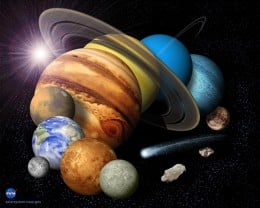Do you think that humans will one day inhabit another planet? And if so, which
Do you think that humans will one day inhabit another planet? And if so, which one?

I have not done much research on this, but I think the only candidate, so far, is Mercury. But we would only occupy a thin ring where day meets night. I understand the temperature in this area is ideal for human survival, because there is never direct sunlight, as Mercury does not rotate in relation to the Sun; one side always faces it. Radiation from the Sun could be a problem, but if we lived within some of the deep craters near the poles, that problem could be sovled, plus we would have access to the (frozen?) water now believed to exist at those poles. We would have to build domes to live in, and large flat greenhouses that would supply our oxygen.
I don't know which planet they will discover and inhabit but it is guaranteed that MAN will find another planet to live on since, we have partially ruined the present one so, we outta find a new place to live on....
Yes I think we will. First we will inhabit Mars. It will be a long time before we inhabit any planets outside of our solar system. We will need a world ship to travel the galaxy and colonize planets or we will need a breakthrough in interstellar travel before we do this.
absolutely though i don't know if it will be a planet in our solar system. if it is i would have to say mars.
I think we should accept that though human beings are carrying out space research that our research is only into near space. We do not have the technological capability to soar our hundreds of miles into far outer space. So yes I think human being living in space is an attainable idea but and probably easier to make happen than it was. But if we do live in space it will be the closer planets that we have seen and noted. Perhaps Mars, Jupiter, Plato and Saturn. Bet remember that it would take human beings some tough skills to live on any of these planets. We can not take for granted that water, oxygen, and gravity are present in space. Building a space city, or a town or colony in outer space would take time, perseverance and skill. And a good amount of engineering skills to adapt the conditions of outer space to make them suitable for human beings to inhabit. It is all achievable but will not be easy or all comfortable. Getting to outer space, to travel their and then to live there, on any of the planets has to be planned and managed. Just the journey to another planet from earth is difficult, to then survive the arid dark and infertile natural conditions of living on another planet is even harder.
I think Mars because Nasa has approved a £275million mission to finally discover if Mars ever harboured life.
A spacecraft will probe the Red Planet's atmosphere, focusing on what happened to its water.
Mars Atmosphere and Volatile Evolution, or Project Maven, is set to lift off in November 2013.In this planetary system (the Solar system), Mars is the most likely candidate. In its favor: solid surface, slight atmosphere and not horribly cold. Against it: extremely thin atmosphere would let smaller meteors hit the surface, it is cold, massive dust storms, no appreciable magnetic field to shield against solar particles, no ozone protection from UV, and no oceans to help ameliorate daily temperature swings and supply that very necessary ingredient for thriving life.
Mercury will not work, except perhaps at the poles. Someone else suggested a ring at the planets terminator (sunset line), but that's based on old data. Mercury is not tidally locked and has a 3:2 rotation to revolution resonance. Nearly all of the planet's surface is alternately frozen and scorched. No atmosphere also makes it impossible to live except in protected, self-sustaining shelters.
Venus is the hottest planet with an oppressive pressure at the surface -- nearly a hundred atmospheres of pressure. Gravity is very similar to that on Earth, but we'd have to do something about thinning the atmosphere and partially shielding the planet to cool it off somewhat. Terraforming this world would prove difficult and expensive.
Jupiter, Saturn, Uranus and Neptune have no solid surfaces and they are incredibly cold. The larger moons of Jupiter are bathed in high radiation and remain extremely dangerous and frozen.
We have not yet discovered any Earth-like worlds beyond the Solar system, but with well-over 500 planets yet discovered (each more like Jupiter or Uranus), there is little doubt that smaller worlds like Earth will one day be found. The difficulty with humanity claiming those worlds lies in the incredible distances to them. As fast as light is (7 times around the Earth in one second), it takes 4 years and 4 months for light to cross the gulf between Earth and the closest star system. Our fastest space craft would take hundreds of centuries to cross that dark sea.
We clearly need a new type of propulsion system -- something which doesn't rely on Newtonian, action-reaction physics, but which manipulates the fabric of space.Yes, I think we human beings will eventually expand into the universe - if we don't do something silly like kill one another off. I think, the Moon will be the first place. The next, Mars. We'll live in sustainable artificial environments and probably feel priviledge to take a holiday on Plant Earth, if we can afford it.
At present we think in terms of Einstein's Theory and assume it'll take us months to get to the nearby solar system planets. But all this could change. Imagine how the technical innovations which have come from electricity and electronics would have appeared to people living only 300 years or so ago - magic.
More magic will happen. And will keep on happening...I also believe what the bible says, but I also like to think that God gave us the knowledge to explore beyond Earth to see what is out there. I do believe that God made this big beautiful universe for us to stand still. That is why I like watching Star Trek shows, because they show that it is possible to explore and to learn about other cultures and worlds. Sadly, if we cannot get it together down here, and get along with each other, then we cannot get it together anywhere, even out in the universe.
No, our planet was placed in the perfect position so that we would never freeze to death or burn to death, if the earth was farther or closer to the sun then that would happen. No other planet is similar to ours so I do not think it is possible. Also God made us earth and thought it was good, so there is no need for another planet with creatures roaming.
Yes, I believe so. Mars, but I don't believe we'll find the money or resources to do it until it becomes absolutely imperative we do so.
I dont think humans would inhabit another one of the planets in our solar system. I think theyd be more likely to inhabit Titan, one of Saturns' moons. There's supposedly water there. There arent reallt any inhabitable planets or moons here outside of Mars.
- Kbraggposted 14 years ago
0
I don't think that we will ever inhabit any of the planets in our solar system. There may be other solar systems out there with inhabitable planets, but the obstacles to being able to reach these planets and insure their inhabitability will be great. Also, another big dilema is finding out if there are any diseases on these planets, as we humans will most likely have no immunity what-so-ever to them.
Sure !!
I not only think but strongly believe the fact that humans will start staying on another planet. And i think besides moon and mars, humans are able to do so on many other planets also.
Related Discussions
- 30
Do you believe that there is life on other planets besides Earth and what makes
by Rodric Anthony Johnson 13 years ago
Do you believe that there is life on other planets besides Earth and what makes you think so.There are so many schools of thought (religious and secular) about life on earth and other planets. Are we alone in the universe or did life sprang into being elsewhere? Did God only have enough time for...
- 4
Do you think that one day we will be able to live on another planet? If so would
by Ninasvoice 13 years ago
Do you think that one day we will be able to live on another planet? If so would you want to?
- 14
Is there life on other planets? What do you think?
by DaniellaWood 14 years ago
Is there life on other planets? What do you think?Scientific descoveries suggest that some planets are too hot or too cold for life and that others have no water and so on. But surely humans and animals canNOT be the only living creatures in the whole of the solar system...some even claim to...
- 111
Do you think humans will go extinct?
by Debra Allen 10 years ago
Do you think humans will go extinct?Will all life also go extinct?
- 10
5 people you choose to go to another planet when Earth dies out....
by icewave5 16 years ago
What 5 people would you choose to go to another planet in a spaceship that only has space for 5 people when earth is dying out because of.... robots?My list1. Top of the list is me, apart from being intelligent and "overly good looking" can provide valuable skills and good offspring also...
- 18
Do you believe humans will actually live on another planet or moon in the future
by MysteryPlanet 14 years ago
Do you believe humans will actually live on another planet or moon in the future?Or perhaps they are doing it now?




















